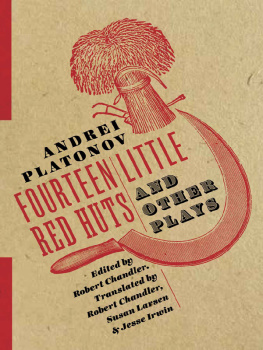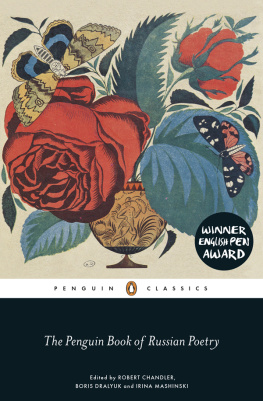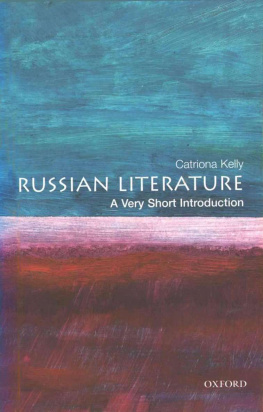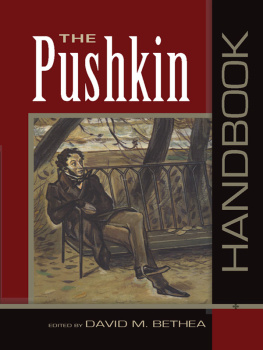Chandler, a superb translator from the Russian, rises to the challenge as he celebrates the writing while dodging the crushing weight of reverence
An engaging and enjoyable brief life of Russias greatest, most quintessential poet
This superb, short book is a masterwork. Chandler dares to wrestle with the icon that is Pushkin and delivers a digestible, readable biography that is as mindful of the mountains of Pushkinian research as it is of the knowledge and interest level of the general reader
Childhood and ancestry
17991811
When Pushkin was one year old, his nurse once took him out to the park. Suddenly coming across Tsar Paul, she did not have time to remove Pushkins little cap. The sovereign went up to her, scolded her for her slowness and removed the childs cap himself. In later life Pushkin was to say that his dealings with the Court went back all the way to the days of Tsar Paul.
P.V. Annenkov, 1855
Alexander Pushkin was born in Moscow on 26th May (6th June New Style) 1799, and he was to remain in Moscow throughout his childhood. He had an elder sister, Olga, and a younger brother, Lev. Five more siblings were born after Lev, but they all died in infancy.
Pushkins mother, Nadezhda Osipovna, was known as the beautiful Creole; one of her grandfathers was a black African. She was domineering and restless; between 1801 and 1811 the family moved from one lodging to another eleven times. If a change of lodging was impossible, she would move the furniture or change the wallpaper. She seems to have been distant, even cruel, in her treatment of Alexander perhaps because he looked like her half-black father, with whom she got on badly; she made it clear that she preferred both Olga and Lev. The lack of contact between Pushkin and his parents was unusual even by the standards that prevailed among the upper classes of the time.
Pushkins father, Sergei Lvovich, seems to have been frivolous, irritable, and dominated by his wife. Little seems to have mattered to him apart from his social life. He was incompetent in his management of the family estate; both he and his wife were only too ready to live beyond their means.
If Pushkins parents were important to his development mainly through their emotional absence, there were other relatives who played a more positive role. His fathers brother, Vasily Lvovich, was a competent poet himself; he was fond of Pushkin and aware of his brilliance. He knew most of the important writers of the time, including the historian Nikolai Karamzin and the poets Batyushkov, Dmitriev and Zhukovsky and most of these writers visited Pushkins home. Pushkin was evidently brought up in an atmosphere that encouraged him to read and write poetry.
By the age of ten, according to his sister, Pushkin had read Plutarch, the Iliad and the Odyssey in French, and much of the eighteenth-century French literature in his fathers library. In other respects, however, he was a poor student, and he seems to have failed, even as an adult, to master basic arithmetic.
Still more important than Vasily Lvovich was Pushkins maternal grandmother, Maria Gannibal. She lived with the family from 1805 and was responsible for the running of the house and the education of the children; it was she who engaged their various French tutors and governesses. Apart from the household serfs, she was the only person with whom Pushkin spoke Russian at home; with the rest of the family he spoke French. She was fond of Pushkin, but she would sometimes tell her friends that she had no idea what would become of him, saying that her elder grandson was a bad student and that he rarely prepared his lessons properly.
Maria Gannibal also helped to instil in Pushkin a sense of family history that was to remain with him throughout his life. It is possible that the inadequacy of his parents made it all the more vital to him to feel a connection to the generations before them.
The Pushkins belonged to the old Russian nobility. They had never occupied the very highest positions in the Russian state, but in the sixteenth and seventeenth centuries several Pushkins had played roles of historical significance; Pushkin includes two of them in his historical drama BorisGodunov. Pushkin took pleasure in the knowledge that several of his ancestors were rebels; he refers several times in his works to Fyodor Pushkin, who was executed for taking part in a rebellion against Peter the Great in 1697 for refusing to yield over a matter of conscience, as Pushkin himself puts it. Pushkin also refers at least twice to his paternal grandfather, Lev Alexandrovich, who lost all chance of promotion at court by remaining loyal to Peter III even after the latter was overthrown by his wife the empress we now know as Catherine the Great.
Important as earlier Pushkins were to him, not one of them was as important to his imagination as his maternal great-grandfather, Abram Gannibal. Gannibals story is unusual, and some elements of it remain controversial. He was born in 1696; it now seems likely that he came not from Ethiopia, as was long believed, but from Chad. As a boy, he was taken by Islamic slave-traders to Constantinople. From there he was taken to Moscow perhaps at the instigation of Peter the Great, who was always interested in anyone or anything exotic. There were, at this time, Negro servants in many of the main European courts. When Abram arrived in Moscow at the age of eight, Peter became his godfather and took responsibility for his education.
Gannibal proved equally gifted in languages, maths and science. As a young man, he became Peters most trusted aide. Sent by Peter to study in France, he was befriended by Diderot and Voltaire, who referred to him as the dark star of Russias enlightenment. Fifty years later, when Diderot needed money, Gannibal would persuade Catherine the Great to buy his library and pay him a pension.
On his return from France, Gannibal was appointed principal translator of foreign books at the Imperial Court. But he not only translated books about scientific and military matters; he was also an uncommonly gifted engineer himself. By 1759 he had been promoted to the rank of general and was in charge of military engineering throughout Russia. One of the forts he constructed Kronstadt in the Gulf of Finland was still of military importance 200 years later, during the Siege of Leningrad. Gannibal was awarded several estates, and he was granted the status of a hereditary nobleman.
The death of the Empress Elizabeth in 1761 put an end to his career, and he spent his last twenty years on his Mikhailovskoye estate, near Pskov. There, in Pushkins words, the black African who had become a Russian noble lived out his life like a French philosophe.
To the end of his life, Pushkin treasured a gift, from his friend Pavel Nashchokin, of an inkwell with a statuette of a black man leaning against an anchor in front of two bales of cotton. Pushkin refers to Gannibal many times in his work, and in 1827 he began a novel about him: TheBlackamoorofPetertheGreat. Pushkins own physical appearance was unusual for a Russian; with his swarthy complexion and his dark, curly hair, he was generally seen as exotic. It seems likely that, in the following passage from TheBlackamoorofPetertheGreat, Pushkin is also describing himself:
Usually people looked at the young blackamoor as if he were a marvel, clustering around him and showering him with greetings and questions, and this curiosity, though seemingly well-intentioned, wounded his self esteem. The sweet attentions of women, almost the only goal of our efforts, not only failed to gladden his heart but even filled it with bitterness and indignation. He felt that they saw him as some kind of rare beast, a kind of special, alien creation that had been accidentally transported into a world that had nothing to do with him.






